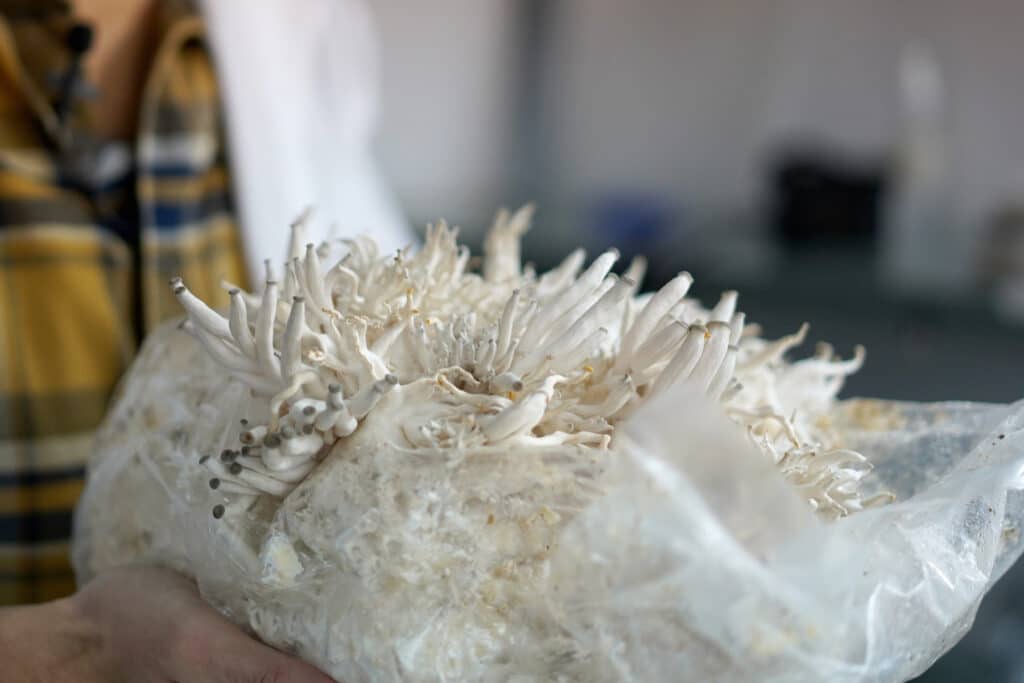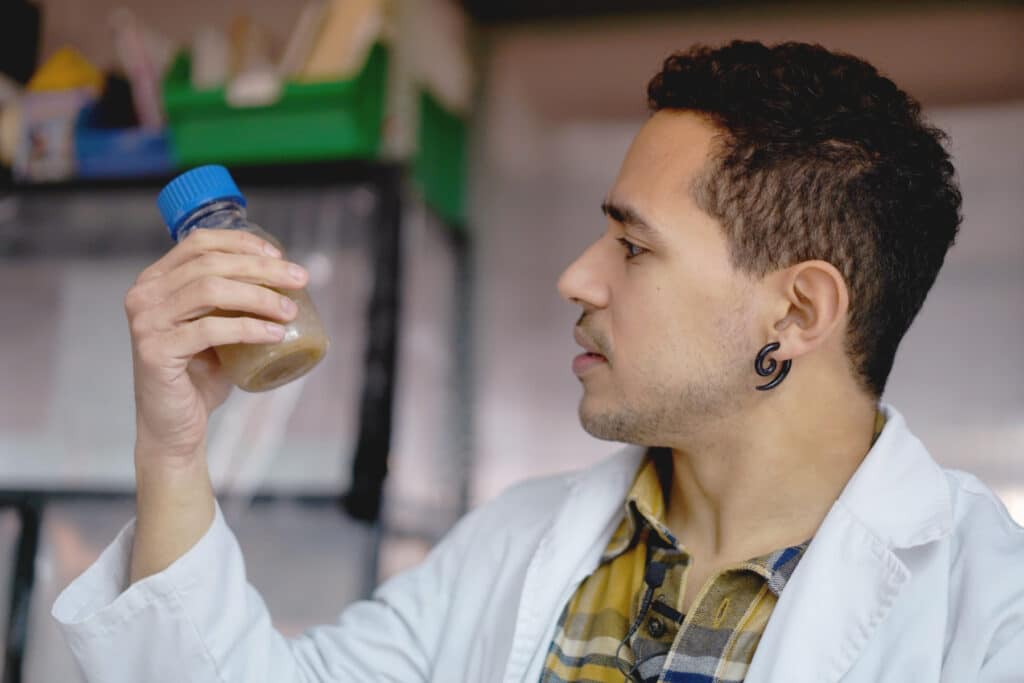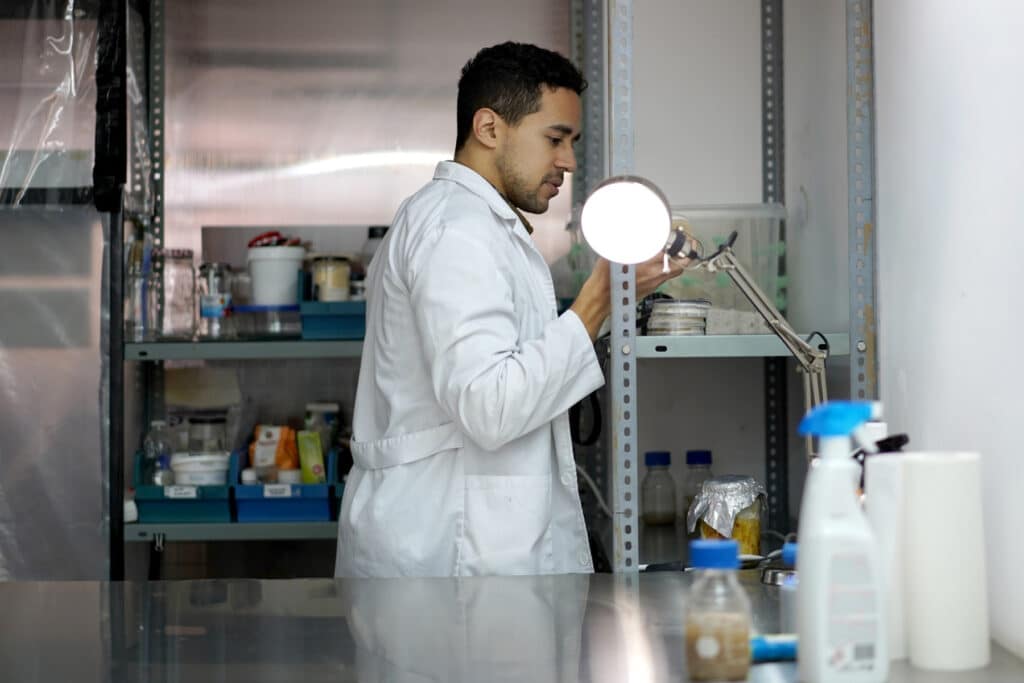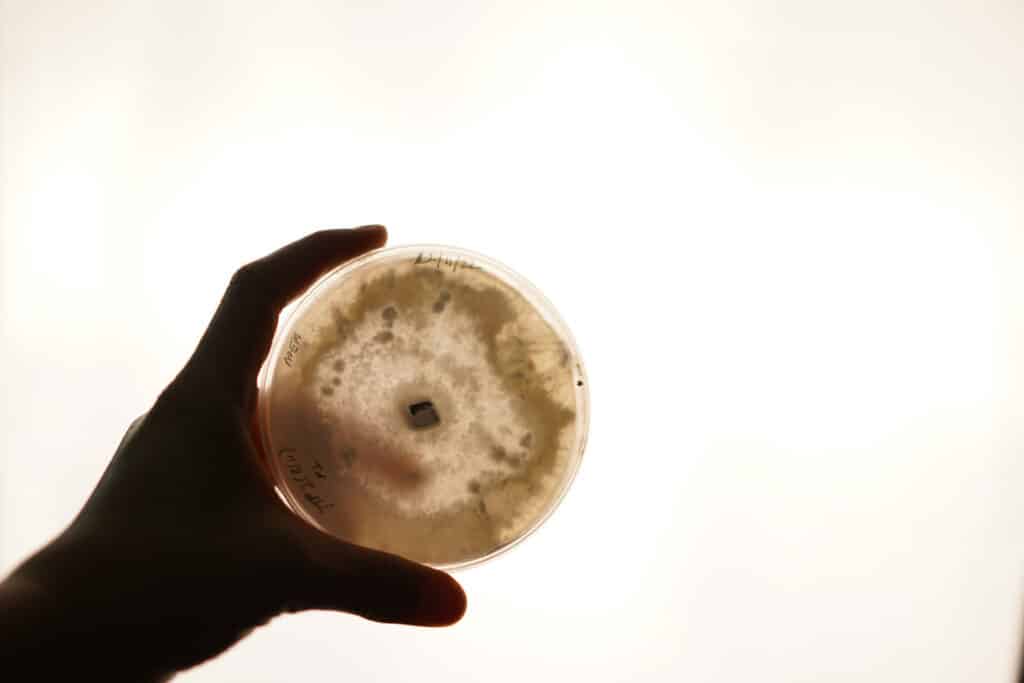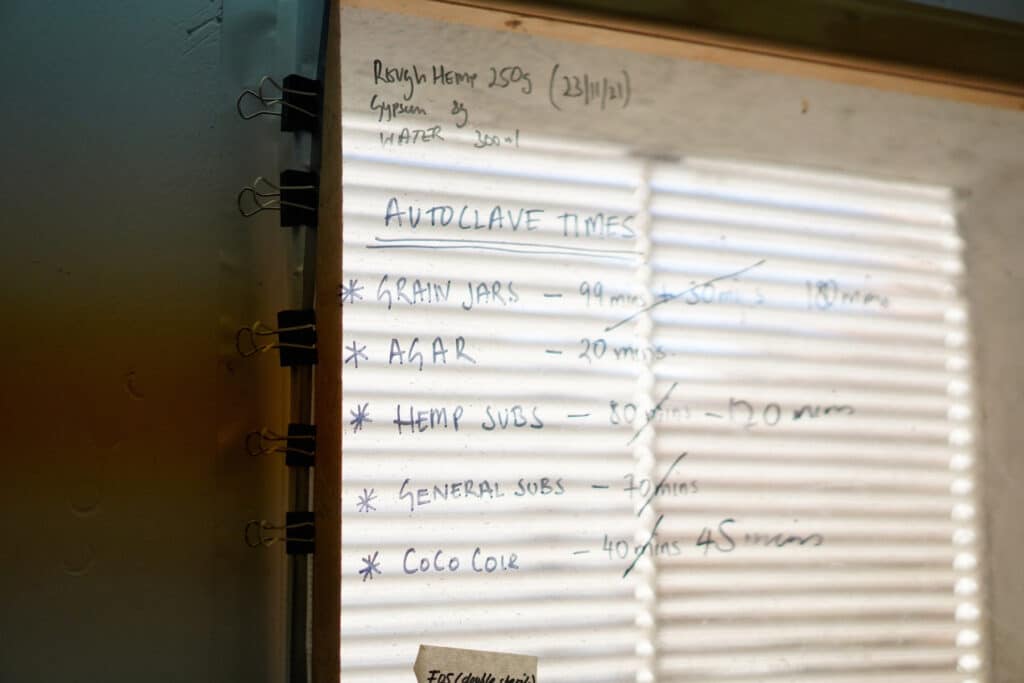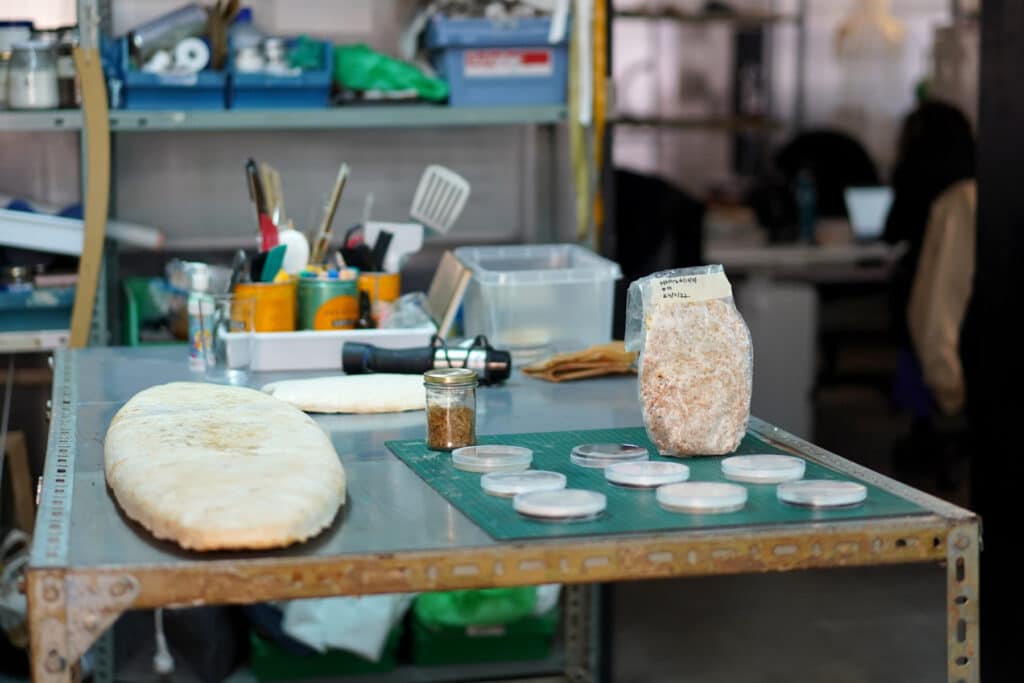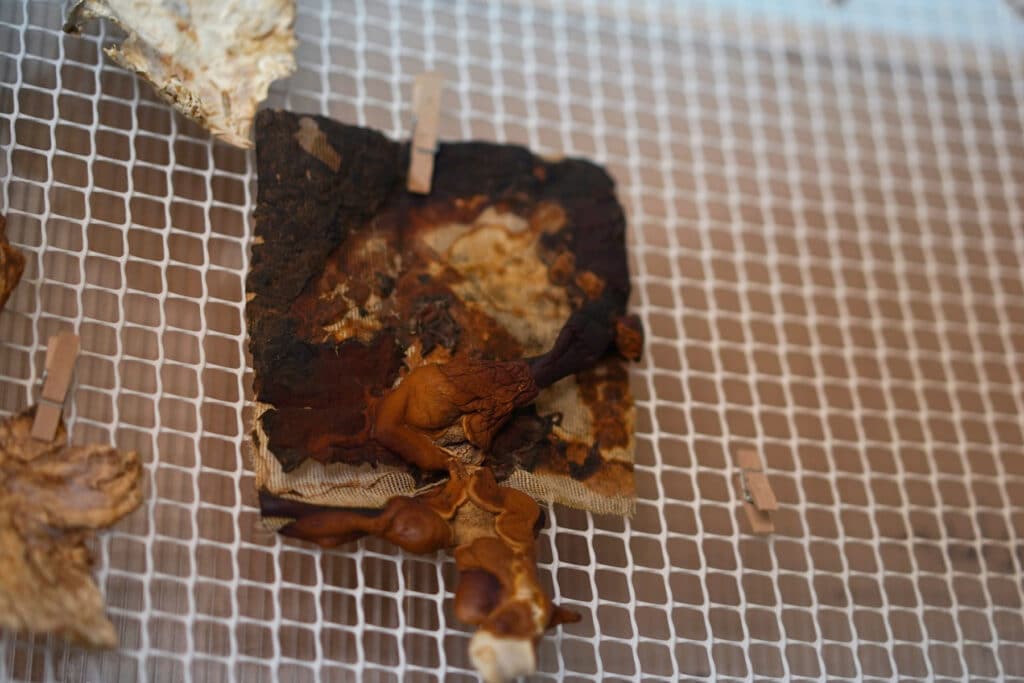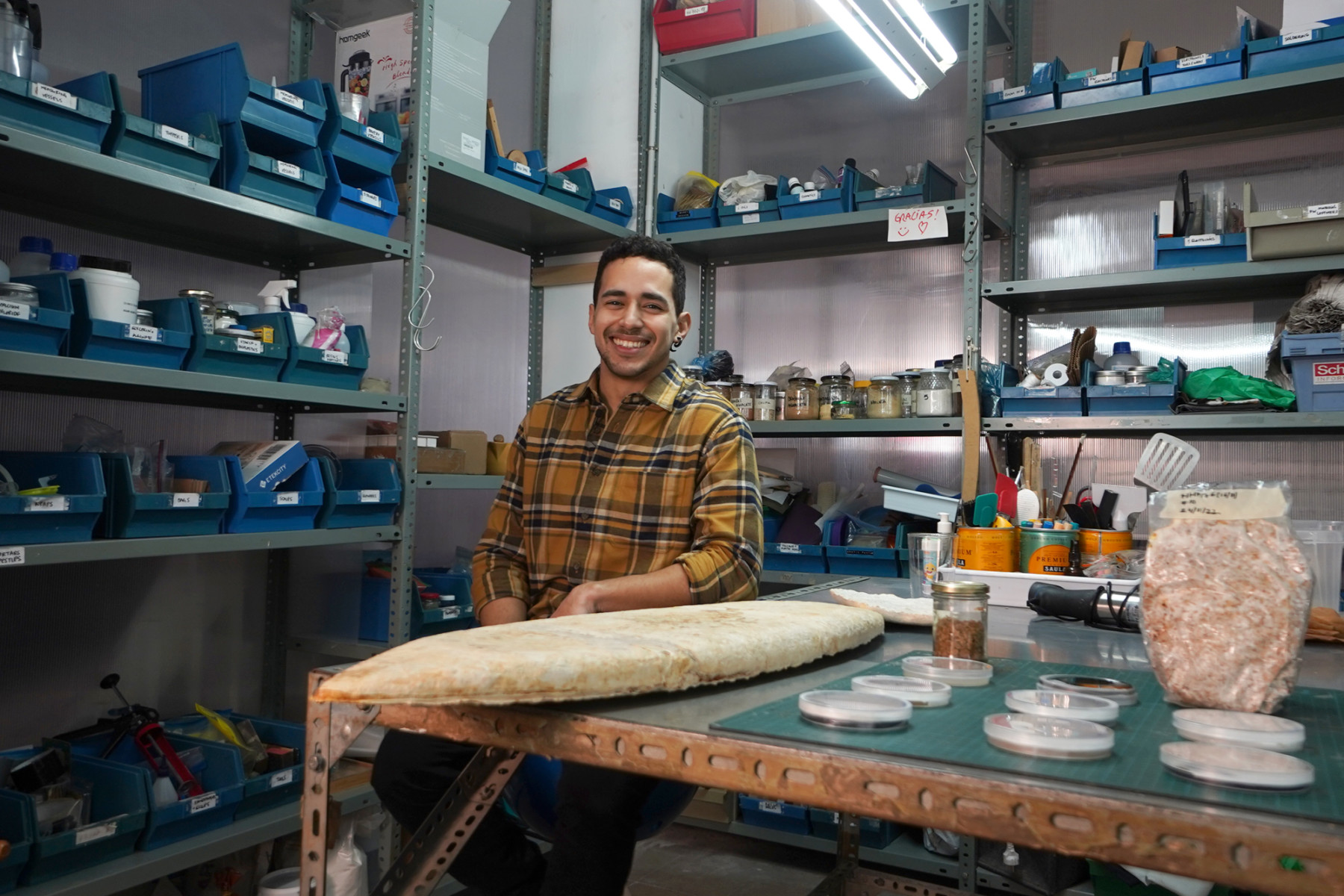
A day of turning fungi into surfboards
The quest to replace plastic with biomaterials in the surfing industry: A glimpse into a curious MDEF alumni project
10 questions and 10 answers: Introducing Roberto Broce, a bio designer and materials researcher from Panama based in Barcelona. In the following interview, he leads us through his MDEF experience, talks about his fascination with fungi and goes in depth into Myke Board – a project looking to reform the contemporary surfboard and revolutionize the surfing industry by replacing plastic with the naturally grown material of mycelium, the root-like structure of the fungi.
- Your project sounds almost impossible. How do you make it possible?
We’re using agricultural waste from farms around Barcelona and mycelium which is the root-like structure of the fungi. It acts as a binding agent and replaces the plastic in surfboards while replicating their buoyancy and lightweight, hydrophobic properties.
- Why did you choose fungi and mycelium as “work colleagues”?
Fungi is such a new industry that was recently recognized as its own kingdom. Just 50 years ago it was considered part of the plant kingdom. There are so many things that we still don’t know about mushrooms, fungi and mycelium that it feels like an open field to work with and experiment. For example, we’re creating this surfboard material from mycelium and you would think that it is something that someone else would have done already because mycelium is such a good replacement for polystyrene and other types of plastic like foam but nobody else is doing this. It’s an open field where we can experiment and try new things, and the best part is the community is so tight-knit that we all just keep helping each other discover new ways of using this amazing material. There are so many things that you can do with this so it just feels like a type of space exploration almost. You’re going there and it’s all this vast emptiness that people haven’t ventured into and it’s very exciting.
“It’s an open field where we can experiment and try new things. The best part is the community is so tight-knit that we all just keep helping each other discover new ways of using this amazing material.“
- Space is the place: Tell us where you develop your project.
The space is our laboratory. We need a space that we can control and that is very sterile so we can grow our mushrooms because the medium that we use for our fungi is also medium that is very much liked by bacteria and other microorganisms, This is why we need a space that we can control completely to grow the mycelium. We have all the equipment we need around here and also the connection to other designers and scientists that we can work together and collaborate with.
- Who do you deal with?
My main partner is Jessica Diaz, who is another alumni from Fab Lab Barcelona! But we also collaborate with other scientists, designers and surfboard shapers from around the city. People are very interested in being part of this project and they have helped us out by donating their knowledge, skills and equipment. We all kind of want to get the plastic out of our oceans. Beyond the main partners, we have been working with the whole community at large.
- Which subject and skills did you learn that inspired and changed your project?
I think it was my second week at MDEF when we did the Biology Zero class and it was just amazing to me because I was already interested in biology but having the expertise of Nuria and Jonathan and their guidance really just ignited the curiosity I had not just for fungi but also for the whole biology at large. I ventured into bacteria, and I became interested in it, in the process of creating body energy and how that could maybe affect the way fungi itself would grow in different atmospheres. I would also like to add that the design studio class really pushes you into trying new things and into going a little further, getting out of your comfort zone, making interventions, talking to new people, hearing new ideas and new perspectives.
There’s a lot of skills I picked up at MDEF that I didn’t have before that have been very useful for Myke Board. All the fabrication skills that I picked up from Fab Academy for example have been tremendously useful. I didn’t know how to 3D model before, I didn’t know how to do molds, I didn’t know how to work with wood or any of those things and I learned all those, which has been tremendously useful in this project and that would otherwise have been really expensive to learn. Thankfully, I learned a wide set of skills that are now part of this project.
- Is there life after MDEF? Tell us about the process.
I began developing new ways of using mycelium. I started off with acoustic and insulation panels and then as they made me think a little harder about the project and its impacts I realized there was a lot more impact into creating something that would degrade or break very quickly. Through a process of brainstorming, trial and error, I landed on the surfboard. I started developing it which was very much a challenge because it needs to resist the ocean current, the force of a person and a lot of stress so it’s very challenging. I started developing that and once MDEF finished I kept working on it. I stayed with the project and now it’s this product that has really grown and I want to take it even further.
- But how did you manage to further develop your project financially after your graduation?
Right before graduating from MDEF I had met Jessica and we had decided to do this partnership for the surfboard. After graduating, I suddenly had all this time, knowledge and networks so I decided to group all those things together and really work on the project. Shortly thereafter we started developing different prototypes for the surfboard and then embarked into this crowdfunding campaign where we received funds from all over the world. Thanks to this, we reached our goal and were able to expand our lab. We then grew larger surfboards and made human-sized prototypes that we could use for more funding later on and maybe scale up the project into not just Barcelona but different areas around the world where surfing is a thing. The quest is to replace plastic in the surfing industry.
- What’s next? Explain your future plans.
We want to make the world a better place. The thing is some of us want to make the world a better place out of a point of pessimism where we’re a bit nihilist about the future and we’re trying to make something better for those around us whereas some of us want to make the world a better place from the point of optimism. We create this biomaterial thinking that change is possible and we can bring this new material into the industry. We can slowly but surely make a change into the way things are done. From just being in MDEF and being surrounded by all these very motivated people that really want to make a change in the world, I feel really hopeful that the future is definitely going in the right direction. I feel like people are waking up to the idea that the way things have been going in the past 50 years isn’t necessarily the best way things could be done and alternatives are present and very real. From the response we’ve gotten from the crowdfunding campaign, everything has been very well received by the people outside of the Fab Lab Barcelona and IAAC circles; they want these solutions. They want to be able to replace the plastic that they use in their day-to-day lives. It’s our job to change that reality. I feel like that challenge of being able to bring these new materials, these new ways of living into people’s lives, is very hopeful and it definitely is an agent for change.
“After graduating, I suddenly had all this time, knowledge and networks so I decided to group all those things together and really work on the project.“
- What would you recommend to your past-self?
Maintain curiosity! Actually, to be even more curious. At the beginning of MDEF, I was only curious about anything related to biology and I felt like throughout the program I developed more of a curiosity for things like artificial intelligence or technology that were not necessarily related to biology. Had I been just extremely curious from the beginning of things that are outside of the scope of biology I feel like maybe I would have learned things that I otherwise wouldn’t have. So my suggestion to my past self is just stay curious, be curious about even more things, learn from your peers, learn from your teachers. Everyone has something to show you.
10. In a nutshell: who would you recommend MDEF to?
I would definitely recommend it to people who are especially motivated to change their surroundings and want to learn how to make the world a better place for themselves and the people around them.
Curious to learn more?
Read everything there is to know about the Master in Design for Emergent Futures!
